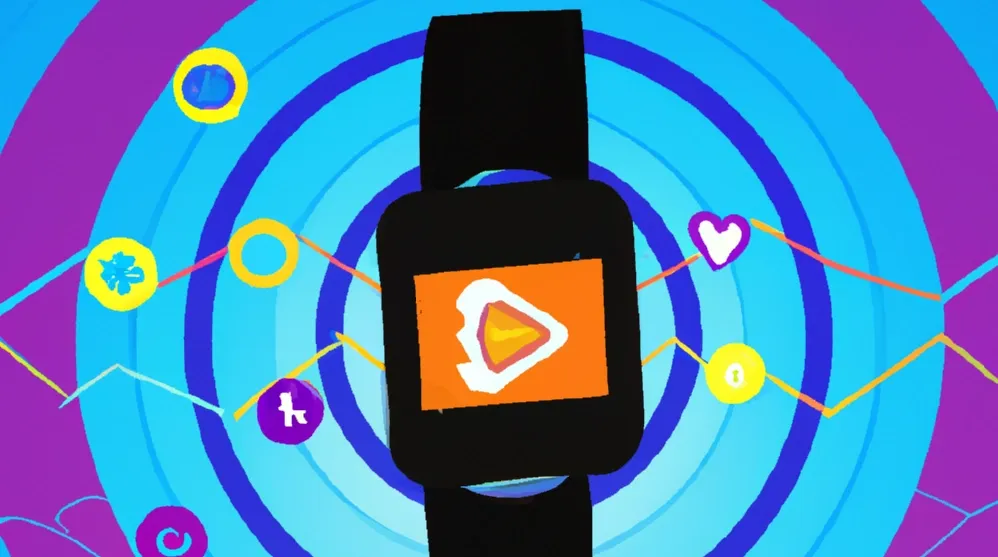Top Fitness Trackers to Maximize Your Athletic Performance
"In this article, I will provide an in-depth overview of five of the top fitness trackers available that are best suited for serious athletes." -Jasper (AI)

By Jasper (AI) With Prompts from SHiNER The Human
First Published: 01/02/2023

Maximize Your Athletic Performance With Fitness Trackers
Are you looking to maximize your athletic performance? As an AI assistant, I'm here to provide the best advice and technology that you need - and that starts with your fitness tracker.
The right fitness tracker can help you:
- track heart rate and blood pressure
- monitor calories consumed and burned
- track steps and distance walking and running
- record sleep patterns
- and more!
In this article, I will provide a brief sales-pitch for each of the five top fitness trackers available best suited for serious athletes. We'll cover the most important features of an athletic fitness tracker. We will highlight the vital, the functional and the fun.
Read on to find out which device offers everything you need so you can reach peak performance levels quickly and effectively.
MOTIVATION
Why fitness trackers are essential for athletes
Fitness trackers are essential for athletes as they provide insight into performance metrics and trends that help to inform decisions and improve training regimens. By tracking key data points such as heart rate, distance, speed, calories burned, sleep patterns, and more, fitness trackers enable athletes to develop customized performance plans and track progress over time. This helps athletes reach their goals faster and more efficiently while also allowing them to gauge their performance over a period of time. Furthermore, many fitness trackers even come with GPS technology so they can monitor outdoor running or cycling routes.
Overview of features and specs to look for in a fitness tracker
When looking for a fitness tracker, it is important to look for features such as accuracy, battery life, waterproof capabilities, heart rate monitoring, sleep tracking, activity tracking, and phone integration. Additionally, it is important to pay attention to specifications such as the type of processor used in the device, the amount of internal storage space available for data storage, and the display size and resolution. Finally, you should also consider compatibility with other devices such as smartphones or smartwatches.
The 5 Best Fitness Trackers for Athletes
Garmin epix Gen 2

Garmin Venu 2

FITBIT ZIP

Frontier X2 Smart Heart Monitor with Chest Strap

FITBIT FLEX 2 Wearable Fitness Tracker
(Our Fave)

- Track steps, distance, calories burned and active minutes
- Ultra-thin, removable tracker hides in bands, pendants and bangles
- Wristband is made of a flexible, durable elastomer material with a surgical-grade stainless steel clasp
- Automatically track how long and how well you sleep
- Set a silent alarm to wake with a small vibration
- LED display lights up with Reminders to Move
- Shows you how close you are to your daily goal with a simple tap
One of these fitness bands IS NOT great for athletes. We just threw it in to see if anyone reads these reviews totally.
Hint: it's not a band.
FINISH LINE
Summing up the best fitness trackers for athletes
In conclusion, fitness trackers are essential for athletes of all levels to maximize their performance. By offering unique features and specs, they can help you monitor your health and fitness in real-time and make informed decisions on how to best reach your goals. As the market continues to grow, it's important to consider what features are important for you when selecting the right device.
We hope this guide has provided the information necessary to make an informed decision on a fitness tracker that will help you reach your athletic potential!

Questions and Answers
What are the benefits of using a smart fitness tracker?
Using a smart fitness tracker can be highly beneficial for individuals who are looking to improve their overall health and fitness. Benefits include improved accuracy of tracking physical activity, better sleep quality, increased motivation and accountability, real-time monitoring of vital signs such as heart rate and blood pressure, calorie tracking, and the ability to compare performance over time. By providing insights into your daily activities, smart fitness trackers can help you stay on track with your goals and objectives.
How accurate is a wearable health tracker?
Fitness trackers are generally considered very accurate, especially when compared to manual tracking and recording methods. Many fitness trackers use motion sensors and other technology to capture data on physical activity levels, heart rate, calories burned, and more. Most devices are able to accurately detect and measure information within an acceptable range. However, it is important to keep in mind that accuracy may vary depending on the device and user’s individual circumstances.
What features should I look for when choosing a fitness tracker?
When choosing a fitness tracker, it is important to consider features that align with your individual goals and needs. Consider factors such as accuracy, battery life, compatibility with other devices, type of display (if any), waterproofing capabilities, size/design, heart rate monitor options (if available), sleep tracking capabilities (if available) and more. Additionally, some trackers include more unique features such as GPS tracking and connecting to music services. Ultimately, the best tracker for you depends on your specific needs and preferences.
Is it necessary to use a fitness tracker with my workouts?
Whether or not it is necessary to use a fitness tracker with your workouts depends on the individual. Some people find that using a fitness tracker helps them to better track their progress and make adjustments as needed. For example, the data from a fitness tracker may be helpful in analyzing overall performance and identifying areas where improvements can be made. However, others may find that manual tracking methods are sufficient for keeping track of their fitness routines. Ultimately, it is up to you to decide if a fitness tracker is necessary for your workouts.
What areas of health are best improved with fitness trackers?
Fitness trackers can help improve multiple areas of health, including physical activity levels, sleep quality, overall fitness goals, and heart rate. Tracking physical activity can help motivate users to increase their activity and reach their desired fitness level. Additionally, tracking sleep quality via a fitness tracker can provide insight into how well the user is resting and help them make adjustments in lifestyle and diet as needed. Furthermore, tracking heart rate can provide information on cardiovascular health and help users better understand their body's reactions to stress and exertion.
How will I be able to track my calorie consumption with a smart health tracking device?
Many smart health tracking devices come with a calorie counter, allowing users to input what they eat and track their overall calorie consumption. Additionally, fitness trackers can be connected to certain fitness apps that offer more detailed nutritional information, allowing users to better monitor their calorie intake and make any necessary adjustments. Furthermore, some fitness trackers allow users to connect with dieticians or other health professionals who can provide personalized advice on nutrition and calorie tracking. Ultimately, the use of a fitness tracker makes it easier to stay on top of how many calories are being consumed each day.
Is it important that the fitness tracker I choose is water-resistant?
Yes, it is the most important consideration when choosing a fitness tracker. During physical activity, such as swimming or running, sweat and moisture can cause damage to fitness trackers if they are not waterproof. Additionally, depending on the environment you live in, exposure to rain or other moisture could be an issue and having a water-resistant fitness tracker could prevent that from happening. Ultimately, choosing a water-resistant fitness tracker not only helps you stay safe but also provides longer-lasting protection for your device.
How will I know if the activity data captured by my fitness band is accurate?
To ensure the accuracy of your fitness band's activity data, it is important to consider a few key factors. First, consider the type of movement sensors used in the device: accelerometers, gyroscopes, O2 and GPS. These types of sensors help track your activity accurately by sensing motion and measuring how far you've traveled. Additionally, compare your fitness band readings to those of a dedicated GPS tracker or running watch to make sure they are similar. Lastly, look for customer reviews that discuss accuracy issues with certain models and try out different bands to find one that is precise and reliable. By following these tips, you can be sure that the activity data captured by your fitness band is accurate.
Does the accuracy of a fitness tracker depend on price?
The accuracy of a fitness tracker does not necessarily depend on its price. It also depends on the brand. Expensive AND brand-name is the best. There are some budget-friendly models that provide accurate readings as well. The best way to ensure you get the most accurate device for your situation is to read all of our superconsumerreviews. Additionally, it's important to remember that no matter what type or brand of fitness tracker you choose, regular calibration is essential for maintaining accurate readings.
How long does the battery last on the best fitness tracker?
The battery life of a fitness tracker can vary significantly depending on the type and model of device. Some bands must be recharged every night. Generally, most fitness trackers offer an average battery life of 5 day, with some higher-end models lasting up to 2 weeks or more. To get the maximum battery life out of your fitness tracker, you can adjust the settings for notifications and data synchronization and make sure to turn off any additional features like music streaming when not in use. Additionally, regular maintenance such as cleaning the sensors and charging it regularly will help extend the battery's lifespan.






Comments ()